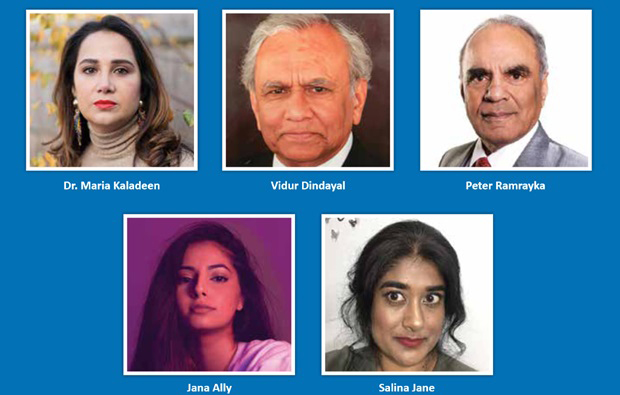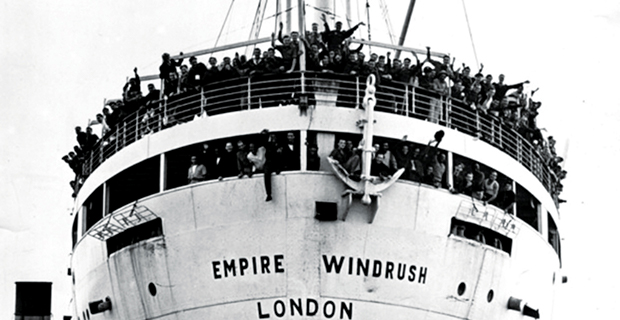THE WINDRUSH GENERATION
The Windrush Generation refers to Caribbean migrants who travelled to England from 1948 to 1973, some of whom were Indo-Caribbean. The Immigration Act was established in 1971, but came into force in January 1973, significantly restricting the rights of Commonwealth citizens to settle in the UK. The Windrush Generation was named after the ship HMT Empire Windrush which brought the first large group of West Indian migrants to the UK on June 22, 1948. They were all invited to help rebuild the country after World War II.
Indo-Caribbean migrants - descendants of Indian indentured labourers brought to the Caribbean - contributed significantly to the UK’s economy and cultural diversity. They faced considerable challenges, including racial discrimination and socio-economic hardships while striving to integrate into British society. In their book The Other Windrush, editors Maria Kaladeen and David Dabydeen highlight the hidden history of a “minority within a minority”: Caribbean migrants of Indian and Chinese descent who were the “invisible passengers” of the Windrush generation.
The following are excerpts of the 218th ICC Thought Leader’s Public Forum held on July 28, 2024 on the topic: “Indo-Caribbean Migrants in England (1948-1973) – The Windrush Generation.” The public meeting was chaired by Shakira Mohommed, moderated by Shalima Mohammed, and hosted by the Indo-Caribbean Cultural Centre (ICC) in a collaboration with the Ameena Gafoor Institute (AGI). See the unedited recording: (https://shorturl.at/c3A74)

The featured speakers included * Dr. Maria Kaladeen, an Associate Fellow at the Institute of Commonwealth Studies, Editor at the Ameena Gafoor Institute, and Co-editor with David Dabydeen of The Other Windrush: Legacies of Indenture in Britain’s Caribbean Empire. * Vidur Dindayal, 90 years old, born in 1934 on Blairmont sugarcane plantation in Guyana. He migrated to India, and later to England in 1962 at the age of 27 as part of the Windrush Generation where he became an author and architect. * Peter Ramrayka, he migrated from Guyana to England in 1961 and joined the Royal Air Force as part of the Windrush Generation. His autobiography Recycling a Son of the British Raj tells the story of his journey and challenges. * Jana Ally, growing up as a mixed Indo-Guyanese and Egyptian woman from Wembley, she has a deep understanding of migration stories. Her grandparents arrived in London during the Windrush era as a misunderstood ethnic minority and * Salina Jane, a British artist of Indo-Guyanese descent who creates art about the experiences of her family’s journey from India - through indentured labour - to Guyana, and their migration to the UK in the 1950s as part of the Windrush Generation.
Dr. Kaladeen said: “In 1961, my Guyanese father - then age 23 - boarded a ship bound for England to become one of around 450,000 people from the Caribbean who would, in later years, come to be framed as the Windrush Generation. It is my personal experience as a child from a family of children, born to a mixed marriage, that the racism was as indestructible as the generation that experienced it. Despite what they endured, the list of notable British people in public life who trace their roots to this migration is endless, with King Charles describing the contribution that this generation had made to the UK as immeasurable.”
DINDAYAL said: “Most Indo-Caribbean immigrants, like me, came to the UK as it was always promoted as a place for betterment. In Guyana, the British Council sponsored training for potential senior staff, and thus they were informed about the opportunities. Although they were subjected to racism, this did not deter the Windrush Generation from seeking stability through working in various civil services.”
Ramrayka said: “When the Empire Windrush arrived, the impression at the time was that it was bringing back British servicemen. My journey began when I arrived in Britain at the age of 17 in July 1961 and almost immediately joined the air force afterwards. In November 1970, I started a career at the National Health Service. However, at the time it was not felt that a brown person could hold a management position, so they mostly went into fields like nursing.”
Ally said: “In recent years children of the Diaspora have been passionate about their fight for representation in Britain and the wider world. Since COVID, the younger generations have been digitally connecting to communities to share common experiences and create wider communities as well as find a sense of home.”
Jane said: “My dad came to the UK in 1956, and he was following his brothers who were already here. He said to me before we came here that you would have thought it was heaven because Britannia ruled the waves, but he admitted that he never felt British. They generally steered clear of white people and stuck to their community, mostly keeping to themselves.”
--The author is a recipient of the Hummingbird Silver medal











Comments.